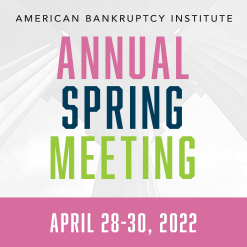| |
| |
| vol 20, num 1 | March 2022 |
| |
|
|
| |
|
|
|
|
|
| |
| The Limited Legacy of Lerbakken: Consumer Debtors Can Exempt Unencumbered, Qualified Retirement Funds Awarded in a Divorce |
| It has been two years since the Eighth Circuit Court of Appeals affirmed the BAP’s ruling in In re Lerbakken disallowing a debtor’s claimed exemption in retirement funds awarded by divorce dissolution under 11 U.S.C. § 522(b)(3)(C). The 2018 BAP opinion sent shockwaves throughout the bankruptcy community, drawing a clear distinction between an allowed exemption for funds placed in a retirement account created and contributed to by the debtor versus funds placed in a retirement account created and contributed to by the debtor’s ex-spouse, but awarded to the debtor in a pre-bankruptcy divorce decree. The Eighth Circuit’s 2018
ruling employed the Supreme Court’s line of reasoning in Clark v. Rameker, a decision that lives in infamy for its exclusion of inherited IRAs from the definition of exempt “retirement funds” under § 522(b)(3)(C). It was expected that chapter 7 trustees would emerge as beneficiaries of the BAP’s bright-line rule excluding divorce-transferred IRAs from the meaning of “retirement funds” under § 522(b)(3)(C). It appears, however, that the Eighth Circuit Court of Appeal’s decision tempered the BAP’s ruling — so much so that a debtor’s fear of losing their award in an ex’s divorce-related retirement account has all but dissipated. |
| |
|
|
|
|
| |
|
| |
| Court Outlines Bases for In Rem Relief Under Section 362(d)(4) |
| As the Bankruptcy Abuse Prevention and Consumer Protection Act of 2005 (the Act) works through its rebellious teenage years, courts continue to address debtor behavior through the provisions of the Act impacting the applicability of the automatic stay. Without limitation, courts have grappled with the substantive and procedural implications of the Act’s “repeat filer” provisions set forth in §§ 362(c)(3) and 362(c)(4). However, there has been somewhat less court activity with respect to the Act’s addition of § 362(d)(4).
Section 362(d)(4) allows for in rem relief from stay under certain circumstances evidencing a debtor’s abuse of the bankruptcy process.
|
| |
|
|
|
|
| |
|
|
|
|
|
|
|
|
|
| |




